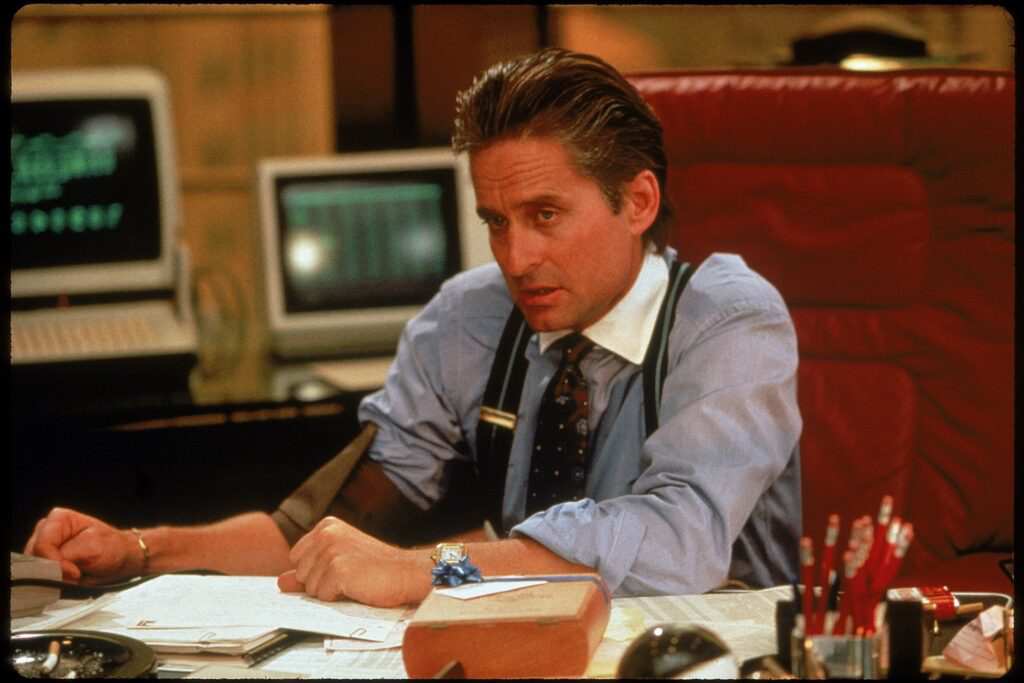Michael Douglas has had a successful and varied career in both film and television, earning him widespread praise as an actor and producer. Born on September 25, 1944, in New Brunswick, New Jersey, he came from a notable Hollywood family, with his father being legendary actor Kirk Douglas. Douglas’s involvement in several financially successful films brought him widespread fame. Best Actor at the Academy Awards in 1987 was given to him for portraying Gordon Gekko in the film “Wall Street.” This role also garnered him a Golden Globe Award. His career has been highlighted by roles in critically acclaimed films including “Fatal Attraction,” “Basic Instinct,” and “The Game.”
Douglas has expanded his horizons beyond acting to include filmmaking. Several critically acclaimed films have been produced by his firm, Furthur Films. Douglas’s contributions to the entertainment sector have grown increasingly important in recent years. As Liberace, he received numerous accolades and recognition for his role in the 2013 film “Behind the Candelabra,” including an Emmy, a SAG Award, and a Golden Globe.
In addition to his Hollywood career, Douglas has also tried his hand at roles on television, most notably as Sandy Kominsky, an elderly acting coach, in “The Kominsky Method,” for which he won a Golden Globe. With his portrayal as Hank Pym in the “Ant-Man” movie, Douglas once again demonstrated his versatility by participating in the Marvel Cinematic Universe. His resume features films from all across the world, including the Chinese picture “Animal World.”
Douglas is well-known for his charitable work outside of the entertainment industry. His dedication to social justice is shown in the fact that he is a member of the committee that chooses the winners of the Jefferson Awards for Public Service. Michael Douglas was just inducted into an elite group of individuals by being awarded the Honorary Palme d’Or at the Cannes Film Festival. This prize honors his remarkable achievements and indelible mark on the film industry. Douglas’s film legacy keeps growing, making him one of Hollywood’s most revered and successful individuals.
Greed Captures The Essence Of The Evolutionary Spirit
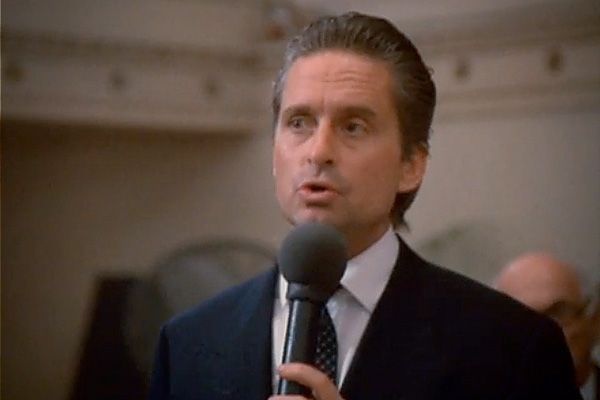
There are many kinds of evil in media, from the downright villainous ones to the lawful or even rightful antiheroes in today’s movies. Gordon Gekko’s evil was a teaching experience in many ways. Out of the many insights he delivered on the screen, viewers are likely to find one or two exceptionally true. And this one is one of those truths.
In his words, “Greed, for lack of a better word, is good.” He made the point that greed is a clean drive that “captures the essence of the evolutionary spirit.”
Or in other words, greed is fundamental to our survival, and without it, we wouldn’t have come this far. If you think about it, it’s perfectly true. But does this mean we should openly embrace greed?
To some extent, yes. But all that greed entails isn’t healthy or even safe for a civilized society. That, however, is a topic for a complete digression by the world’s leading philosophers – not you or me.
Let’s come back to our focus on Gordon Gekko and how he utilized greed and, by extension, how he actively preached about its power.
By any and all definitions, Gekko is the villain of the movie. He’s supposed to be the standard Wall Street executive, a child of greedy capitalism who lacks empathy. But what does his philosophy mean?
Gordon Gekko vs. Real-Life Insider Trading Today: A Character Study
The portrayal of Gordon Gekko in “Wall Street” provides a cinematic window into the world of insider trading, illuminating its appeal, its consequences, and the regulatory responses to it. In the film, Gekko benefits personally from his unethical behavior, but he loses money and ends himself in jail as a result. Insider trading in the real world now is much more complex than it was in the past. Despite increased laws and monitoring, there are still situations when people are tempted by the promise of insider information. When compared to today’s regulatory framework, Gekko’s fictitious antics show the ongoing difficulty of preserving market integrity and the severe repercussions that real-life insider trading can still have.
Gordon Gekko’s Philosophy
Gordon Gekko is a Wall Street stockbroker and corporate raider. He is the main antagonist of Oliver Stone’s Wall Street (1987). Gordon Gekko is a very charismatic and ruthless businessman who has no problem with using illegal or unethical means to achieve his goal.
Gekko’s philosophy, which he calls “greed is good” in the film, reflects his belief that capitalism needs to be unregulated and free from government intervention. He believes that wealth should be privatized so that only those who have earned it should benefit from it.
Gekko also believes that people should use their talents to make money for themselves rather than work for someone else. In Wall Street, he says: “I’ve made more money than I know what to do with over the past twenty years.” His character reflects his beliefs about the power of greed and how money can make people happy.
In the movie Wall Street, Gordon Gekko is a stockbroker who makes his name as an expert on stocks and financial markets. He has made his career by convincing investors that they can make money by buying and selling stocks, futures, options, and bonds.
However, in the real world, it is not easy to make big sums of money by trading stocks. The reason for this is that many other people are also trying to make money from investing their money in stocks and other financial instruments.
The key to making big sums of money in the stock market is to be able to predict which companies will do well and which will not do well. This requires knowledge about the economy and business news from around the world. It also requires some skill in picking out trends in financial markets over long periods of time.
Gordon Gekko’s character represents the idea that there are individuals who know how to get rich by understanding how markets work, predicting trends, and taking advantage of them before anyone else does. He believes that anyone can become wealthy if they follow his advice on how to make money in the stock market.
He essentially represents the philosophy of greed. He is a very rich man, and he wants to keep it that way. He doesn’t care about anything else but money. He doesn’t care if he won or lost, what people thought of him, or how much money he had in his account.
Gekko additionally represents human nature to be greedy and self-centered. We all want to be rich, but we don’t realize that money isn’t everything. It is not good for your health, it makes you lose touch with other people, and you become isolated from them. You lose your friends and family, and your life becomes nothing but money and status symbols like cars, houses, and clothes.
Gekko also represents the fact that we all need to learn from our mistakes because nobody gets away with everything forever in this world!
Who Is Gordon Gekko?
Let’s take a step back. To fully understand the man’s vision and philosophy, it’s imperative that we know all that there is to know about him.
In one way, it means all that director Oliver Stone wished to show us. The writers wrote in the script, etc. But in a different way, it also means we should first analyze the making of the standard Wall Street financier and how (or, more importantly, when) greed comes into play and empathy leaves the picture.
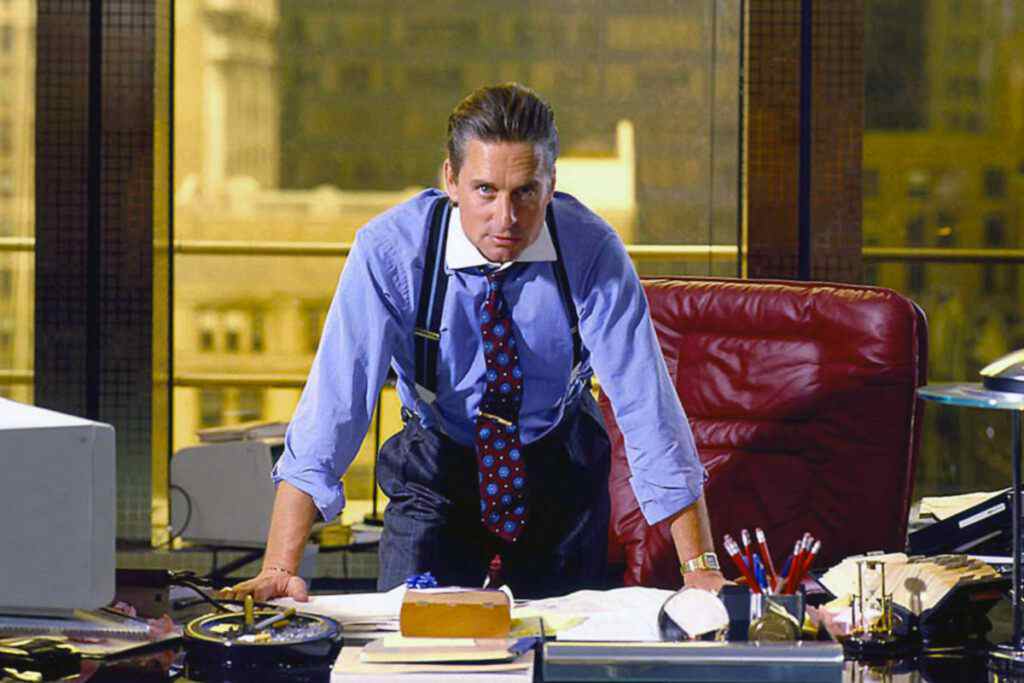
The character of Gordon Gekko in Wall Street is meant to represent greed and corruption in the world of business.
Greed is a very powerful emotion, and it can drive people to do some pretty crazy things. It’s hard to imagine how anyone could be driven by greed alone, but that’s exactly what happened with Gordon Gekko. After he lost his job at Budweiser, he decided that it was time for him to become wealthy again. He knew that he could make more money than anyone else in corporate America if he just worked his way back up through the ranks of Wall Street. Unfortunately, this was not easy when you were on the wrong side of the law.
It takes a special kind of person to make it big in corporate America today. If you don’t have good connections or money behind you, it’s going to take longer than most people think before you can make it big on Wall Street. It also helps if you have something that other people want and are willing to pay top dollar for (like drugs). In fact, there are many people who live off the profits from drugs alone; they don’t need much else from their day jobs because they have already reached a level where their needs are met.
The full quote that Gordon delivers as part of his speech to the shareholders is as follows:
“I am not a destroyer of companies. I am a liberator of them! The point is, ladies and gentlemen, that greed, for lack of a better word, is good. Greed is right; greed works. Greed clarifies, cuts through, and captures the essence of the evolutionary spirit. Greed, in all of its forms – greed for life, money, love, and knowledge – has marked the upward surge of mankind. And greed, you mark my words, will not only save Teldar Paper, but that other malfunctioning corporation called the USA.”
Gordon Gekko As A Composite Character
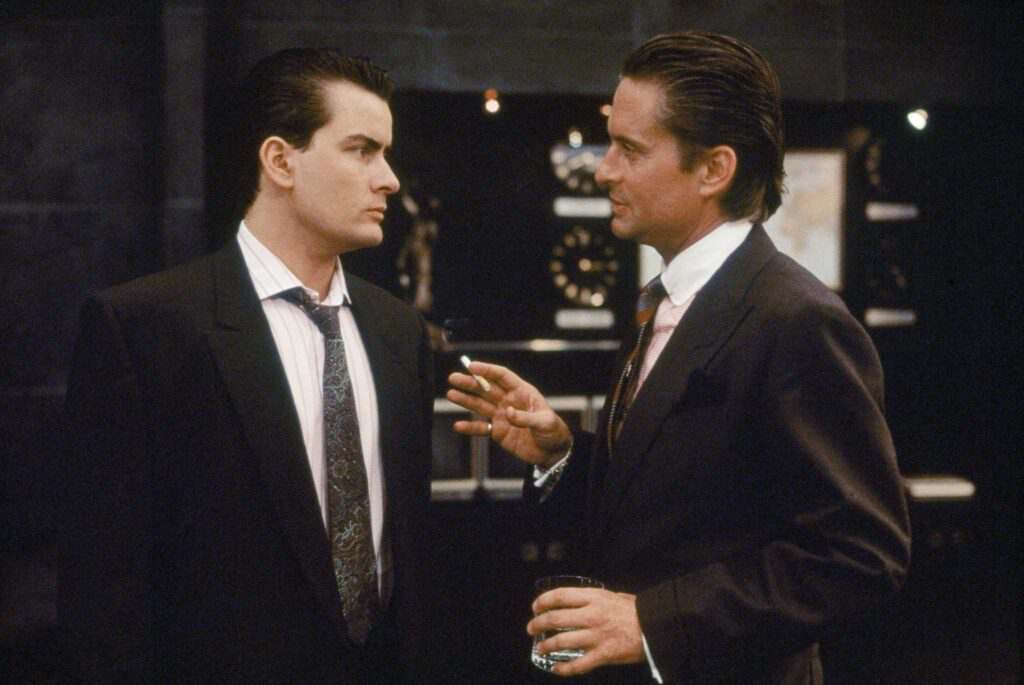
Gordon Gekko is not based on any real person. But that doesn’t make him an aberration in our reality. His inspiration is derived from real Wall Street financiers. In fact, co-writers Stanley Weiser and Oliver Stone once said that he is a composite character based on multiple financiers.
Oliver’s real experience of the cutthroat way of life in Wall Street finance, coupled with the superb performance by Michael Douglas, made the movie a huge success at the box office.
The character of Gordon Gekko in Wall Street stands for the excesses of greed and ambition and the moral fallibility of those who engage in such behaviors.
Greed is the demon that has been unleashed on the world. There is no way to stop it. You either feed it, or you die. Greed will always win out over its victims because there are only so many people alive on this planet and, therefore, only so much wealth to go around.
In the film Wall Street, Gordon Gekko says, “greed is good.” He says this because he believes that a person can only be as successful as they are greedy. For him, greed is not an emotion but a value system that must be followed at all costs if one wishes to succeed in life.
This explains why he was able to amass so much wealth from his work at Drexel Burnham Lambert: He knew how to play the game better than anyone else around him, and therefore he was able to get away with doing things that others would never dare do themselves.
Wall Street is a movie about the greed and corruption that plagues our financial system. The film is based on the book of the same name, which was written by Michael Douglas and Charlie Sheen.
The movie follows Gordon Gekko, a ruthless Wall Street trader who has just been released from prison after serving time for defrauding investors. He is now back in business as a stockbroker, and he has big plans: to buy up all of the shares of a company called Slagel Securities in order to control it, then use that power to make millions. As he explains: “Money is my oxygen.”
Gekko’s character represents greed at its worst – he has no moral compass when it comes to money and power, and he’ll do whatever it takes to get it. He doesn’t care about others or about what’s right or wrong; all he cares about is himself.
In some ways, this movie does an excellent job of showing how bad things can get when large amounts of money are involved in an industry where there’s also so much potential for fraud. But even though Wall Street shows us how bad things can get, there are silver linings.
Gordon Gekko is a character who represents the greedy and materialistic aspects of Wall Street. He is known for his iconic phrase, “Greed is good.” Throughout the movie, he tells his colleagues that if they are successful, they will be rich and powerful. He even says that if they do not succeed, they will still be rich and powerful. This is because Gekko believes that money is the only thing that matters in life. He has no morals or values, which makes him an unreliable person to trust with your money.
Gekko’s personality can be seen as one of the strongest characteristics of Wall Street’s greediness. This shows how people on Wall Street are obsessed with money and power rather than caring about other things, such as their families or friends. Although it may seem like Gordon Gekko is just a bad guy who wants to make money out of nothing, many other characters in Wall Street have similar qualities. For example, another main character named Bud Fox has almost the same character traits as Gekko does, but he uses them for different purposes: Bud Fox uses his greediness to get into a major Wall Street firm so he can get promoted quickly instead of making money for himself the tedious way.
Gekko is a man of great wealth who has worked hard to achieve and maintain his position in society. He lives an extravagant lifestyle, which he has earned through his own hard work and by taking advantage of the system of capitalism. He is a man who believes that money rules the world and that it is there for the taking. Gekko believes that if you have enough money, you can do anything you want and get away with it. He represents greed and excess in the world of business, as well as excesses in society at large.
Analyzing Evil: Why Gordon Gekko’s Philosophy Is A Lesson For Us All?
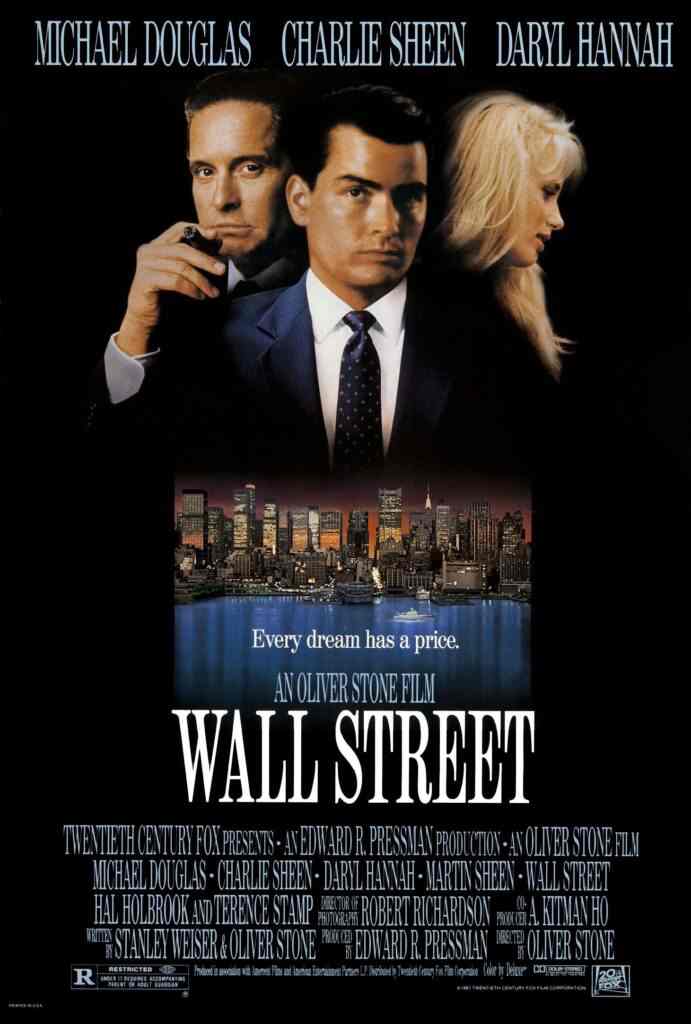
In Wall Street, Gordon Gekko’s philosophy is a lesson for us all. In the story, he points out that greed is good and that people should be willing to take extreme risks in order to achieve their goals. The character of Gordon Gekko is based on a real-life person who used this philosophy as a way of making money.
Greed is good because it motivates people to work hard and achieve their dreams. People will only do what they want if they can see an opportunity for themselves and their families. This is known as the “American Dream” – achieving something through hard work and determination. If someone believes that they can make more money than anyone else in the world, then they will be motivated to do so no matter how risky it might seem at first glance!
Greed also leads people to take risks that others would not dare. When Gordon Gekko says, “greed is good,” he does not mean that you should be selfish or greedy yourself; he means that when you see something that everyone else thinks is impossible, then go ahead and try it anyway! It does not matter whether it will succeed or fail; all that matters is the attempt.
So, Is Greed Good?
In the movie Wall Street, Gordon Gekko’s philosophy is a lesson for us all. He is known as the “smartest man in the world” because he understands the true nature of money and how it works. He is an entrepreneur who uses his knowledge to obtain wealth for his investors.
Gekko states that there are two types of people in this world: those who understand how money works and those who do not. Those who do not understand money are slaves to it and will always be slaves to it, no matter how much they may want freedom from its grasp. They will never be able to attain true freedom until they understand what money really is and how it works within our society. This is the message that Gekko tries to convey through his speech on Wall Street.
Gekko highlights how greed can destroy one’s soul by saying, “greed, for lack of a better word, is good.” He argues that if you have a lot of money and no one can take it away from you, then life will be easy for you and your family. His message is clear: if one wants to achieve success in life, then he must act selfishly and acquire wealth without regard for others.
It is not always easy to follow Gekko’s example, but it can be done with time and practice. In addition to his own personal gain and wealth, he also highlights that greed serves as a good motivator in business and will help us to make more money than our competitors.
Well, greed is not good per se. It leads to corruption and injustice. The problem with greed isn’t that it’s bad; it’s that it tends to corrupt everything it touches. Greed makes people blind to what’s right or wrong because they’re focused on getting what they want at all costs. They don’t see the consequences of their actions on others or even on themselves.
In real life, there are plenty of examples of people who have been corrupted by greed and fallen from grace because of it — athletes who took steroids or other performance-enhancing drugs, politicians who have taken bribes or committed acts of corruption for personal gain or for political gain, etc. But there are also plenty of examples where people have used their wealth as an excuse to do things like start charities or support worthy causes like scientific research or medical research programs that benefit society at large (even though these donations may not produce any immediate financial returns).
Michael Douglas as Gordon Gekko
In “Wall Street,” young stockbroker Bud Fox plays the lead character and is inspired to work with financial industry icon Gordon Gekko. Only when Fox is willing to compromise his principles and give Gekko access to private information about his father’s business is the selfish, unscrupulous Gekko impressed. After Gekko makes Fox wealthy, Fox utilizes state evidence to frame Gekko for insider trading and securities fraud. Michael Douglas won an Academy Award for his portrayal of Gordon Gekko.
Instead of being based on a single individual, Gordon Gekko was created using a variety of real-world bankers. According to Stanley Weiser, who co-wrote the screenplay with Oliver Stone, Carl Icahn, investor Michael Ovitz, and disgraced stock trader Ivan Boesky were all models for Gekko.
Although Gordon Gekko was clearly the antagonist in the film “Wall Street,” many aspiring financiers looked up to him as a mythical antihero. They looked up to the figure as a symbol of success in the harsh business world. Michael Douglas collaborated with the FBI in 2012 on a documentary about insider trading intended to debunk this idea. The fictional character Gordon Gekko worried that, instead of being viewed as a hero, he would be viewed as a villain.
Gordon Gekko Famous Quotes
The famous Gekko quote, “The expression “greed is good,” is a reference to a comment Boesky made in 1985 at the University of California Berkeley School of Business Administration, “I think greed is healthy. Being greedy does not have to make you feel bad about yourself.”
“I don’t throw darts at a board. I bet on sure things. Read Sun-Tzu, The Art of War. Every battle is won before it is ever fought.”
With this, Gekko is unmistakably outlining his idea that it is crucial to conduct a thorough study before making an investment decision. The stock market doesn’t have to be a game of chance; by doing your research on a firm, you may improve your odds of making a successful investment. Don’t gamble with your money; instead, invest it.
Despite his achievements, Gekko lacks a support system and is estranged from his family. He makes the decision that he doesn’t need buddies to achieve his goals because he is aware that not everyone will always support his opinions. You will run into people in real life who will criticize your ideas. Don’t pay attention to them. Understand your identity and your financial objectives. Don’t allow other people’s objectives to derail your own, and that’s the reason he said, “If you need a friend, get a dog.”
Gekko modeled his penthouse office and elegant attire after art collector Asher Edelman. Oliver Stone, the author, director, and co-writer, as well as Gekko’s stern, workaholic speech, were partially adapted from Weiser’s phone conversations and writing sessions.
According to the movie’s producer Ed Pressman, Gordon Gekko was influenced by Michael Milken. Milken, known as the “King of Junk Bonds” in the 1980s, was detained in 1989 and later convicted on a number of charges of fraud. Oliver Stone attributes the motivation for “Wall Street” as a whole to his father, a broker who frequently bemoaned the lack of high-caliber business-related films.
FAQs
Was Gordon Gekko a real person?
Gekko is said to be modeled on a number of actual Wall Street figures, including financier Michael Ovitz, convicted stock trader Ivan Boesky, and corporate raider Carl Icahn.
